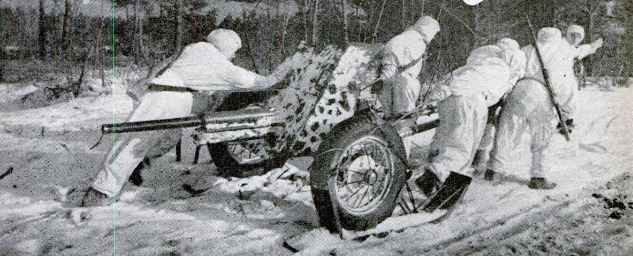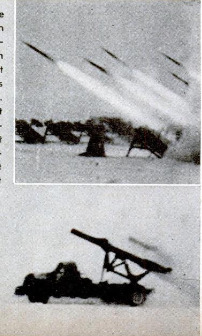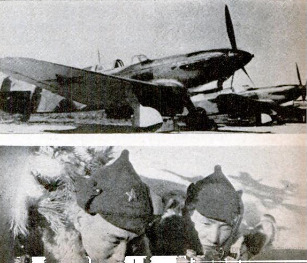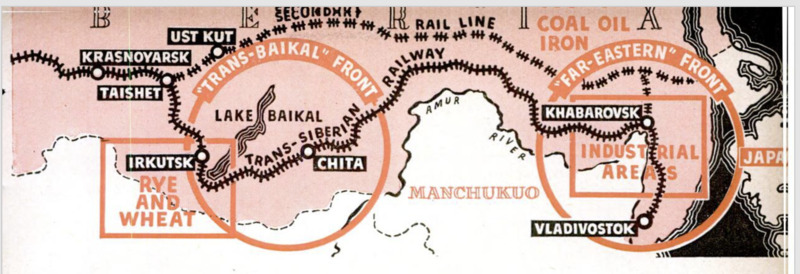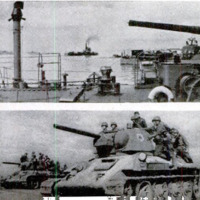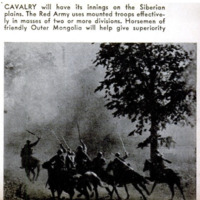A Future Russian-Japanese War
Item
-
Title (Dublin Core)
-
A Future Russian-Japanese War
-
Article Title and/or Image Caption (Dublin Core)
-
When Russia fights Japan. A distinguished war correspondent forecast a colossal war in the Far East- with the Japs as losers
-
extracted text (Extract Text)
-
irae Siberia may become one of the
great battlefields of this war.
For years now, a defiant Russian army
has glared southward across the Amur
River into Manchukuo, where the treacher-
ous Japanese maintain their powerful Kwan-
tung Army.
Two strong forces poised to strike. Two
traditional enemies. Mutual distrust. Mu-
tual hatred. A conflict of interests that goes
back more than 50 years.
‘When that war comes—and the people of
Moscow told me it was inevitable—the world
will find out that the Russians never took
their eyes off the Japanese, even during the
most critical days of the battles for Moscow
and Stalingrad. They never weakened their
Far Eastern force. On the contrary, they
strengthened it, and they will continue to
strengthen it as they continue to wage suc-
cessful warfare against the Germans in the
West.
The Battle of Siberia will be no side show,
but a war with a million men and more on a
side.
In the last two years, the situation in the
Far East has changed considerably. In the
beginning the Russians had their hands full
with the Germans, and the only question
was: Will the Japanese attack? Now the
Russians are fighting a winning war with
Germany, and the question is: Who will at-
tack first, the Russians or the Japanese?
When I first got to Russia, Germany's
mechanized army was driving on Moscow,
and the people asked me: “Do you think the
Japanese will stab us in the back?” But
this year, following the successful Russian
counteroffensive against the Germans west
of Stalingrad, an official of the Russian
Foreign Office told me: “You have been
here long enough to know that when Hitler
is beaten we will take on the Japanese.” _
The only question then is which country
will attack first. The answer provides the
clue to the nature of the campaign that will
be fought.
If Japan attacks, in a suicidal move of
despair, we can expect the Russians to with-
draw into the Siberian wasteland until they
are strong enough to counterattack. But if
Japan waits until Russia attacks, we shall
see Russian troops driving deep into the
heart of Manchukuo. For Russia will attack
only when Russia is ready.
Russia this summer was already on a war
footing in the Far East. Its divisions were
not organized into military “regions,” the
customary peacetime designations that cor-
respond to our “corps areas.” “Regions” had
been replaced by “fronts.” We began to
hear of the “Far Eastern Front” and the
“Trans-Baikal Front.” In Russia the “front”
is a wartime organization headed by a front
commander who directs the operations of
several armies. In each of his armies he has
a separate air force, one or more tank corps,
and anywhere from five to 15 divisions.
Out in Siberia the “Far Eastern Front”
embraced the eastern part of the Russian
line, including the great port of Vladivostok.
But Vladivostok is difficult to defend, so
front headquarters was established farther
to the north in the city of Khabarovsk. Here
the commander was Army General Josef
Apanasenko, a little Cossack called “Her-
cules” by his friends.
The “Trans-Baikal Front” was farther to |
the west—based, as its name implies, just
east of Lake Baikal in the city of Chita.
Its commander was Colonel General Georgi |
Kovalev, a big fellow with many years of
service in Siberia.
If Japan attacked before Russia was ready
in the Far East, Apanasenko would have to
fight to defend the Trans-Siberian Railway,
Vladivostok, and the new industrial areas
that Russia built some years ago to supply
its Far Eastern force. Kovalev would have
to help Apanasenko by hammering at the
Japanese flank, but his great mission would |
be to take a position astride the railway and
prevent the Japanese from pushing along |
it to the west, toward the rye and wheat
fields around Irkutsk and the coal and iron
area of the Kuznetsk Basin beyond Kra-
snoyarsk.
The Japanese might be able to seize Vladi-
vostok in a quick lunge from Manchukuo,
and they probably could cut the Trans- |
Siberian Railway in a number of places.
But the gains would be costly and would
-
Contributor (Dublin Core)
-
Walter Kerr (writer)
-
Language (Dublin Core)
-
eng
-
Date Issued (Dublin Core)
-
1943-11
-
pages (Bibliographic Ontology)
-
65-68
-
Rights (Dublin Core)
-
Public Domain (Google digitized)
-
Archived by (Dublin Core)
-
Matteo Ridolfi
-
Alberto Bordignon (Supervisor)
-
Spatial Coverage (Dublin Core)
-
Siberia
 Popular Science Monthly, vol. 143, n. 5, 1943
Popular Science Monthly, vol. 143, n. 5, 1943

